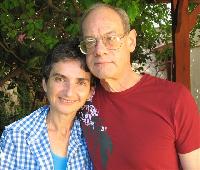| Páginas sobre el tema: [1 2 3] > | Looking for advice on what to do next after completing translation Master's Autor de la hebra: Adam, MA Trans
|
|---|
Hi everybody,
I've just completed my dissertation for a Master's in Translation. I'm awaiting the results, the graduation and certificate, etc,. In the meantime, I'm looking to take my first baby steps into what I hope will be a rewarding career in translation.
Can anybody please advise me what I should do first? I'll be updating (overhauling) my Proz profile and CV once I've received my grades. In addition, I believe our university has an agreement with the IoL, which ... See more Hi everybody,
I've just completed my dissertation for a Master's in Translation. I'm awaiting the results, the graduation and certificate, etc,. In the meantime, I'm looking to take my first baby steps into what I hope will be a rewarding career in translation.
Can anybody please advise me what I should do first? I'll be updating (overhauling) my Proz profile and CV once I've received my grades. In addition, I believe our university has an agreement with the IoL, which enables graduates to join as 'chartered members' - I have no idea how valuable this is. Also, I've read on Proz forums that joining the ITI can be beneficial - although this was disputed by some members. Is there anything else I'm missing? For example, learning to use a CAT tool or joining another organisation?
I'm looking to specialise eventually in marine biology. The ST in my dissertation was on oceanography; I felt I coped very well, given I don't hold any qualifications in science. However, while honing my scientific knowledge, I'm going to focus on general and sports translations. How would one start in scientific translation?
Finally, regarding experience, prior to my studies I spent about 6 years translating for several charities. I suppose I should ask them for a reference to add to my Proz profile?
Sorry if these questions appear juvenile. After spending 2 years in translation academia, I feel a bit overwhelmed by the more professional side of things!
I hope everyone is keeping well and safe. ▲ Collapse
| | | | Tom in London
Reino Unido
Local time: 10:35
Miembro 2008
italiano al inglés
| The next thing to do is.... | Jan 25, 2021 |
...put those qualifications away, and get some work.
q. How would one start in scientific translation?
a. By having scientific expertise in two languages.
[Edited at 2021-01-25 13:03 GMT]
| | | | Adam, MA Trans
Reino Unido
Local time: 10:35
francés al inglés
+ ...
PERSONA QUE INICIÓ LA HEBRA
Hi Tom,
Thanks for your reply.
However, what I was referring to specifically - rather than the expertise needed - was how to make inroads in scientific translation, such as what type of people/organisations would one need to contact.
| | | | Tom in London
Reino Unido
Local time: 10:35
Miembro 2008
italiano al inglés
Adam-MSCR wrote:
Hi Tom,
Thanks for your reply.
However, what I was referring to specifically - rather than the expertise needed - was how to make inroads in scientific translation, such as what type of people/organisations would one need to contact.
"Science" is a very broad term that could include everything from space research to microbiology. What branch of science do you have in mind?
| | |
|
|
|
| Marine biology, Tom | Jan 25, 2021 |
You could contact ten million agencies and pray, but I would start by ruthlessly exploiting your contacts and their friends and family for leads.
And yes, any references you can get would help.
| | | | Adam, MA Trans
Reino Unido
Local time: 10:35
francés al inglés
+ ...
PERSONA QUE INICIÓ LA HEBRA | Primarily oceanography or marine biology | Jan 25, 2021 |
Tom in London wrote:
Adam-MSCR wrote:
Hi Tom,
Thanks for your reply.
However, what I was referring to specifically - rather than the expertise needed - was how to make inroads in scientific translation, such as what type of people/organisations would one need to contact.
"Science" is a very broad term that could include everything from space research to microbiology. What branch of science do you have in mind?
These two branches are the areas I would like to specialise in. Although, I understand from research that a lot of scientists tend to write up their work in English, which apparently has resulted in less traffic in scientific translation. Apparently there is not a lot of demand out there, at least that is what I read in an ITI study.
However, it's certainly a passion of mine. I translated a marine biology/oceanography text for my dissertation and thoroughly enjoyed every word of it!
| | | | | Cart before horse | Jan 25, 2021 |
I think you're coming at this from the wrong angle if you're trying to work out how to get specialised scientific work BEFORE you have acquired any specialised scientific knowledge.
Get the expertise and the work will follow. It can be done, but you have some hard work ahead of you.
| | | | Tom in London
Reino Unido
Local time: 10:35
Miembro 2008
italiano al inglés
| Create your own demand | Jan 25, 2021 |
Adam-MSCR wrote:
.... I understand from research that a lot of scientists tend to write up their work in English, which apparently has resulted in less traffic in scientific translation. Apparently there is not a lot of demand out there, at least that is what I read in an ITI study.
Create your own demand. If you prove yourself to be genuinely expert in those fields and can write better English than the researchers can (because it's your mother tongue and it isn't theirs) you'll find that they'll come to you. But yes - you have a long road ahead of you but (I know it's a hackneyed old saying) a journey of a thousand miles begins with a single step.
[Edited at 2021-01-25 16:51 GMT]
| | |
|
|
|
Rachel Waddington wrote:
I think you're coming at this from the wrong angle if you're trying to work out how to get specialised scientific work BEFORE you have acquired any specialised scientific knowledge.
Get the expertise and the work will follow. It can be done, but you have some hard work ahead of you.
But there is specialised and specialised. You could easily start doing not-too-technical magazine articles and reports aimed at the person on the street, and work your way up if you so choose. It depends partly on how good you are at researching and understanding, I guess. And knowing your limits.
As an example, I mainly translate economic forecasts for banks and central banks. I do not have an economics degree and I couldn’t produce an economic forecast to save my life (they’re none too good at it either to be fair), but I sure as hell know how to translate one.
As you say, scientific papers are very often produced in English now, so you can also learn a lot from editing them.
| | | | | Some possible ideas | Jan 25, 2021 |
Adam-MSCR wrote:
I'll be updating (overhauling) my Proz profile and CV once I've received my grades.
There are some things that it would be worth updating asap. For example, your expertise has sports in third position only and makes no mention whatsoever of any marine sciences. Correcting that, writing some more appropriate words in your About Me text, and adding a few more keywords will only take a minute.
In addition, I believe our university has an agreement with the IoL, which enables graduates to join as 'chartered members' - I have no idea how valuable this is. Also, I've read on Proz forums that joining the ITI can be beneficial - although this was disputed by some members.
I really don't know, but I would consider giving priority to joining an association that uses one of your source languages rather than a second English-centred one.
Is there anything else I'm missing? For example, learning to use a CAT tool or joining another organisation?
Did you really not learn to use CAT tools at uni? What are they thinking of? You definitely need to know what they're all about and how, in general terms, to use them. Better still would be to start using one. As a young newbie you can't afford to be an IT dunce.
The other membership you should consider is somewhere that will act as your shop window. It doesn't have to be here, but this is the biggest marketplace -- by quite a long way. If you were to buy PLUS membership, you'd benefit from the basket of perks. They include a CAT tool, other tools, access to the library of training videos, and membership of a FB group of experienced translators, plus lots more.
I'm looking to specialise eventually in marine biology. The ST in my dissertation was on oceanography; I felt I coped very well, given I don't hold any qualifications in science. However, while honing my scientific knowledge, I'm going to focus on general and sports translations. How would one start in scientific translation?
I suggest you market yourself as having the two specialisations of marine biology and sport. You can justify both. Then accept any job that's going that you feel you could do competently. Apart from applying for publicly posted jobs (far easier as a paying member anywhere), you should start contacting agencies. Start by targeting those boutique agencies that specialise in one of your chosen areas, but only once you're thoroughly happy with your marketing approach. I would suggest sticking with agencies for a year or two, to learn the ropes, before applying to direct clients. You should also use all the social media networks to the full, and maybe set up a blog. Start getting your name out there and associate it always with translation -- you don't have to do a hard-sell job on people.
Finally, regarding experience, prior to my studies I spent about 6 years translating for several charities. I suppose I should ask them for a reference to add to my Proz profile?
Yes, you should ask them to leave feedback in your WWA area. Any agencies you've worked for too (your CV mentions Décathlon, so I imagine that was paid-for work).
Chris S wrote:
As you say, scientific papers are very often produced in English now, so you can also learn a lot from editing them.
I quite agree with Chris on this. You could accept them from authors who speak your source languages and give feedback in a combination of the two languages, and you could accept those written by speakers of other languages, making it an English monolingual experience. You are well qualified for the job and it would be useful experience even if it isn't strictly translation.
| | | | | CIOL, ITI... and surveying | Jan 25, 2021 |
Adam-MSCR wrote:
Can anybody please advise me what I should do first? I'll be updating (overhauling) my Proz profile and CV once I've received my grades. In addition, I believe our university has an agreement with the IoL, which enables graduates to join as 'chartered members' - I have no idea how valuable this is. Also, I've read on Proz forums that joining the ITI can be beneficial - although this was disputed by some members. Is there anything else I'm missing? For example, learning to use a CAT tool or joining another organisation?
Interesting, I hadn't heard of arrangements like this (I'm a member of both the CIOL and the ITI). Does it mean that you become a Chartered Linguist as soon as you have the required amount of experience for CIOL membership? In any case, I'm not sure what kind of benefits you would be hoping for, but if your priority is getting work, then I wouldn't hold your breath too much as all of your source languages are heavily subscribed. There are so many members for FR-EN in particular that you'd be a very tiny fish in an ocean (appropriate metaphor, huh?!) I've been in the CIOL's Find-a-Linguist directory for over 10 years now and don't think I've received a single enquiry for French. Even for Romanian-English, where the number of members is infinitesimally small, I'm not contacted often at all, and even then, it's usually just for small one-off jobs like personal certificates. That said, if work finds its way to you from other sources/websites, then being able to say you're a member of one of these associations is certainly no bad thing. Membership of an association is useful from the point of view of training and networking too, so I'd say it's worth working towards, bearing in mind that it takes a while to gain the required amount of experience.
As for Chartership, it's too early for me to say what that's like in practice as it's something I'm working towards this year and will apply for when I've completed my second year of CPD. I doubt it will make much difference to me at this point in my career, as I've been going for 15 years now. I just see it as another cub scout badge to add to the others I've earned! But I do mean that in a good way...
Digressing a little, I see you have a degree in building surveying. That's very niche in the world of translation! A specialism like that would be fantastic to have as a translator, as construction and engineering are big fields in this business.
| | | | | Degree in building surveying | Jan 26, 2021 |
Adam, did you realise that having a degree in building surveying more or less guarantees you a foot in the door with translation agencies? Yet it is hidden away in your profile at the end of a sentence about sport and fitness. I didn't even notice it. Is there a reason why you want to downplay that?
I think you need to focus on rewriting your profile and marketing materials to emphasise your strengths as you have some USPs that aren't coming across as powerfully as they could.
... See more Adam, did you realise that having a degree in building surveying more or less guarantees you a foot in the door with translation agencies? Yet it is hidden away in your profile at the end of a sentence about sport and fitness. I didn't even notice it. Is there a reason why you want to downplay that?
I think you need to focus on rewriting your profile and marketing materials to emphasise your strengths as you have some USPs that aren't coming across as powerfully as they could.
Once you have established yourself in a technical field it may be easier to make the switch to oceanography if that is what you want to do. I entered the translation profession with a degree in German and Economics and ended up translating engineering texts and then focussing on renewable energy so it can be done, but it takes quite a bit of work (I studied a part-time engineering degree and am now studying a master's in renewable energy). ▲ Collapse
| | |
|
|
|
| Specialisation, expertise? | Jan 26, 2021 |
Not sure what you all mean when you talk about "specialisation" and "expertise". I've never had any qualifications in the areas I've translated over the years, just my language skills. I'm not the only one either. I wish experienced translators wouldn't frighten off beginners like this, it's very arrogant.
| | | | | Just my take on things | Jan 26, 2021 |
Maybe it does sound arrogant.
I do think that the answer to 'how do I specialise in X field' is 'get expertise in X field' not 'find work in X field' though. For one thing, the second approach is unlikely to work without some element of the first to back it up (unless you are very lucky).
This is based on my own experience. If I was giving advice to my past self, that's what it would be.
[Edited at 2021-01-26 17:00 GMT]
[Edited at 2021... See more Maybe it does sound arrogant.
I do think that the answer to 'how do I specialise in X field' is 'get expertise in X field' not 'find work in X field' though. For one thing, the second approach is unlikely to work without some element of the first to back it up (unless you are very lucky).
This is based on my own experience. If I was giving advice to my past self, that's what it would be.
[Edited at 2021-01-26 17:00 GMT]
[Edited at 2021-01-26 17:24 GMT] ▲ Collapse
| | | | Dan Lucas 
Reino Unido
Local time: 10:35
Miembro 2014
japonés al inglés
| Try freelancing again for a bit, then report back | Jan 26, 2021 |
Gerard Barry wrote:
Not sure what you all mean when you talk about "specialisation" and "expertise". I've never had any qualifications in the areas I've translated over the years, just my language skills. I'm not the only one either. I wish experienced translators wouldn't frighten off beginners like this, it's very arrogant.
Given that you appear to be an in-house translator who has in the past stated that "there are often days on end where I literally translate nothing", I'm sceptical that your recent experience is relevant to freelancers.
On these forums we regularly see posts by translators who are fighting to get decent work at decent rates. That's a bit more of an existential struggle than your "enervating" (as you put it) problem of simply not having enough to do. Nevertheless, I'm sure it is hard in its own way, and you have my sympathies.
With that in mind, I'm having difficulty seeing anything in your posts that suggests you would prosper as a freelancer in today's markets (reminder: no unions, no guaranteed monthly income, no employment protection). But if you feel like proving me wrong, I would eagerly follow a thread in which you quit your current job, strike out again as an independent supplier, and report your progress here on the forum.
But that's all by-the-by. To return to Rachel's comment, those of us who do prosper as freelancers mostly feel we succeed as a result of having something unique or unusual to offer clients. A strong specialisation is the most obvious example of this. So yes, in the view of Rachel, myself and many others, expertise does indeed help, and we dispense advice accordingly. It's up those asking for advice to decide whether it is persuasive or not.
Of course, opinions differ on what constitutes a good qualification. Your comment reminds me of a thread a couple of years back started by somebody who had worked for 25 years in a large albeit sleepy organisation as a in-house translator. He was perturbed that he had not had a single job as a freelancer since leaving his previous post, and couldn't understand why clients weren't queuing up to avail themselves of his services. "I used to work for the UN!" he protested. To his mind, that was a valuable qualification.
As I recall, we had to explain to him that in contrast to in-house sinecures like those offered by the major international NGOs, competition in the freelance industry is fierce and competence needs to be demonstrated on a daily basis, not merely asserted. I think that was his first and last thread before disappearing, apparently in a huff.
You wouldn't be that chap under a different name, by any chance?
Regards,
Dan
| | | | | Páginas sobre el tema: [1 2 3] > | To report site rules violations or get help, contact a site moderator: You can also contact site staff by submitting a support request » Looking for advice on what to do next after completing translation Master's | Pastey | Your smart companion app
Pastey is an innovative desktop application that bridges the gap between human expertise and artificial intelligence. With intuitive keyboard shortcuts, Pastey transforms your source text into AI-powered draft translations.
Find out more » |
| | Trados Studio 2022 Freelance | The leading translation software used by over 270,000 translators.
Designed with your feedback in mind, Trados Studio 2022 delivers an unrivalled, powerful desktop
and cloud solution, empowering you to work in the most efficient and cost-effective way.
More info » |
|
| | | | X Sign in to your ProZ.com account... | | | | | |




























